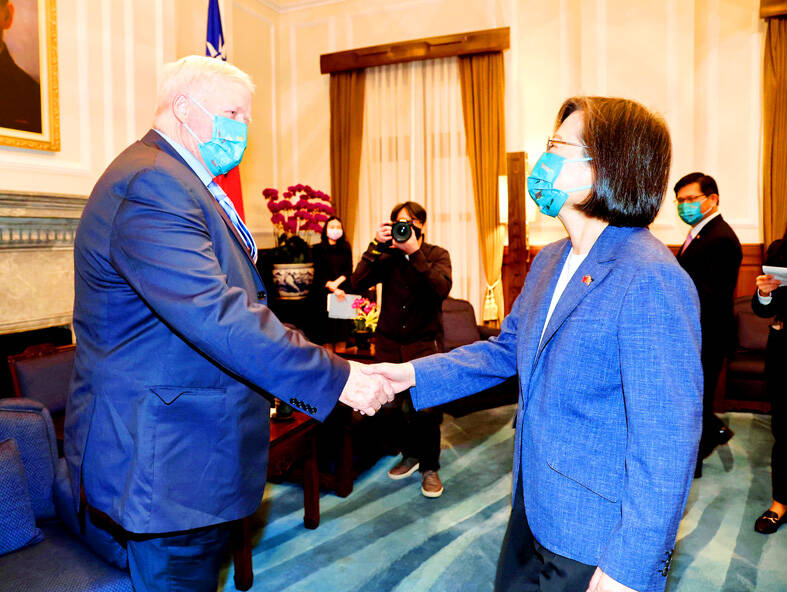Visiting British lawmaker Bob Stewart yesterday praised the progress of democracy in Taiwan during a meeting with President Tsai Ing-wen (蔡英文) at the Presidential Office in Taipei.
A cross-party parliamentary delegation led by Stewart, who cochairs the British-Taiwanese All-Party Parliamentary Group, arrived in Taiwan on Sunday for a six-day visit.
The six MPs in the delegation, three from the Conservative Party and three from the Labour Party, are “really big friends of Taiwan,” Stewart said.

Photo: CNA
He praised Taiwan as a nation that is “more democratic than the UK,” citing the Democracy Index 2022 report released by the London-based Economist Intelligence Unit earlier this year, which ranked Taiwan 10th and the UK 18th.
The index showed “how far democracy has come over the last 30 years in this country,” he said, adding that Taiwan is “a beacon of how democracy can work in the world.”
The UK and Taiwan are both island states, share similar attitudes and have close economic connections, he said.
Many Taiwanese live, work and study in the UK, and he hopes to see a similar trend among Britons in the future, he said.
He thanked Tsai for meeting the group, saying that he was unable to meet with the president during his previous trip to Taiwan in 2016 as she was busy inspecting areas struck by a typhoon at the time.
Tsai thanked the delegation for their support for Taiwan, saying that the delegation’s visit could help the two forge closer ties.
The UK has since 2021 used the G7 and other bilateral or multilateral platforms to underline the importance of maintaining peace and stability across the Taiwan Strait, she said.
The British parliament has been a vocal supporter of Taiwan in recent years, she added, citing discussions about Taiwanese-British friendship and cooperation in February last year and a visit by a British House of Commons Foreign Affairs Committee delegation in November last year.
More than 30 British offshore wind power developers have set up offices in Taiwan, she said, adding that Taiwan and the UK complement each other in supply chain resiliency, cybersecurity, healthcare and biotechnology, creating mutually beneficial outcomes.
Tsai also expressed hope that the UK’s accession to the Comprehensive and Progressive Agreement for Trans-Pacific Partnership would be smooth and that it would support Taiwan’s bid to join the agreement.

Taiwan is projected to lose a working-age population of about 6.67 million people in two waves of retirement in the coming years, as the nation confronts accelerating demographic decline and a shortage of younger workers to take their place, the Ministry of the Interior said. Taiwan experienced its largest baby boom between 1958 and 1966, when the population grew by 3.78 million, followed by a second surge of 2.89 million between 1976 and 1982, ministry data showed. In 2023, the first of those baby boom generations — those born in the late 1950s and early 1960s — began to enter retirement, triggering

ECONOMIC BOOST: Should the more than 23 million people eligible for the NT$10,000 handouts spend them the same way as in 2023, GDP could rise 0.5 percent, an official said Universal cash handouts of NT$10,000 (US$330) are to be disbursed late next month at the earliest — including to permanent residents and foreign residents married to Taiwanese — pending legislative approval, the Ministry of Finance said yesterday. The Executive Yuan yesterday approved the Special Act for Strengthening Economic, Social and National Security Resilience in Response to International Circumstances (因應國際情勢強化經濟社會及民生國安韌性特別條例). The NT$550 billion special budget includes NT$236 billion for the cash handouts, plus an additional NT$20 billion set aside as reserve funds, expected to be used to support industries. Handouts might begin one month after the bill is promulgated and would be completed within

NO CHANGE: The TRA makes clear that the US does not consider the status of Taiwan to have been determined by WWII-era documents, a former AIT deputy director said The American Institute in Taiwan’s (AIT) comments that World War-II era documents do not determine Taiwan’s political status accurately conveyed the US’ stance, the US Department of State said. An AIT spokesperson on Saturday said that a Chinese official mischaracterized World War II-era documents as stating that Taiwan was ceded to the China. The remarks from the US’ de facto embassy in Taiwan drew criticism from the Ma Ying-jeou Foundation, whose director said the comments put Taiwan in danger. The Chinese-language United Daily News yesterday reported that a US State Department spokesperson confirmed the AIT’s position. They added that the US would continue to

The National Development Council (NDC) yesterday unveiled details of new regulations that ease restrictions on foreigners working or living in Taiwan, as part of a bid to attract skilled workers from abroad. The regulations, which could go into effect in the first quarter of next year, stem from amendments to the Act for the Recruitment and Employment of Foreign Professionals (外國專業人才延攬及僱用法) passed by lawmakers on Aug. 29. Students categorized as “overseas compatriots” would be allowed to stay and work in Taiwan in the two years after their graduation without obtaining additional permits, doing away with the evaluation process that is currently required,